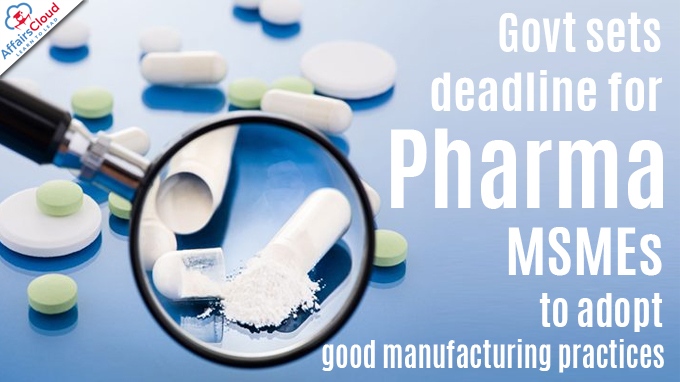 On August 2, 2023, the Union Minister Mansukh Mandaviya, Ministry of Health and Family Welfare (MoHFW) has made it mandatory for all Micro, Small & Medium Enterprises (MSMEs) drugmakers/pharma companies with an annual turnover of over Rs 250 crore to adopt Good Manufacturing Practices (GMP) within six months starting August 1, 2023.
On August 2, 2023, the Union Minister Mansukh Mandaviya, Ministry of Health and Family Welfare (MoHFW) has made it mandatory for all Micro, Small & Medium Enterprises (MSMEs) drugmakers/pharma companies with an annual turnover of over Rs 250 crore to adopt Good Manufacturing Practices (GMP) within six months starting August 1, 2023.
- Companies with a turnover of less than Rs 250 crore can complete the process in 1 year.
- The adoption will be made by implementing the revised Schedule M of the Drugs and Cosmetics Act, 1940. It should be noted that World Health Organisation (WHO)-GMP standards are now a part of the revised Schedule M.
- Drugmakers, who fails to follow the timeline, will be penalized.
Reason behind this implementation:
This decision has been taken for the proper implementation of the Schedule M of the Drugs and Cosmetics Act, 1940 which has not been implemented accurately by the majority of the drugmakers.
Background:
Officials inspecting 162 units and 14 public testing labs discovered significant issues like poor documentation, lack of validation, infrastructural deficiencies, unqualified employees, and faulty design. This resulted in a review of the current Schedule M’s principles and GMP concepts to align with global standards. The Drug Technical Advisory Committee also recommended this to improve documentation, failure investigation, and technical expertise for better compliance.
Key Changes:
The major changes that will happen with the introduction of a revised Schedule M to support upgradation of the units are:
- Introduction of Pharmaceutical Quality System (PQS)
- Quality Risk Management (QRM)
- Product Quality Review (PQR)
- Qualification and validation of equipment, change control management, self-inspection and quality audit team, suppliers audit and approval, stability studies as per recommended climate condition, validation of GMP related computerised system, specific requirements for manufacturing of hazardous products, biological products, radiopharmaceutical and phytopharmaceuticals.
What is Schedule M of the Drugs and Cosmetics Act, 1940?
It regulates GMP and quality management systems followed by pharmaceutical manufacturing units, including specific requirements pertaining to premises, plant and equipment.
About GMP:
Good Manufacturing Practices (GMP) are mandatory standards which build and bring quality into product by way of control on materials, methods, machines, processes, personnel and facility or environment etc. These were first incorporated in Schedule M of the Drugs and Cosmetics Rules, 1945 in 1988, and were last amended in 2018.
Key Points:
i.There are around 10,500 manufacturing units in the country, of which around 8,500 fall under micro, small and medium level enterprises, or MSMEs.
ii.India is a major exporter of medicines to Low and Middle-Income Countries (LMIC) which require GMP certification from the World Health Organisation (WHO)
What is WHO GMP certification?
WHO GMP certfications is for the quality of pharmaceutical products moving in international commerce. The guidelines for the same were endorsed by the World Health Assembly (WHA) in 1997.
- It ensures that medicinal products are consistently produced and controlled to the quality standards.
- WHO-GMP certification is valid for three years.
- It violation will result in cancellation of licence and monetary penalty.
Recent Related News:
i.On 8th June 2023, The World Health Organisation (WHO) and the Global Fund to Fight Acquired Immune Deficiency Syndrome (AIDS), Tuberculosis (TB) and Malaria (the Global Fund) signed a new and revised Strategic Framework for Collaboration.
ii.On 27th June 2023, the World Health Organization (WHO) and the International Council for Harmonisation of Technical Requirements for Pharmaceuticals for Human Use (ICH) announced a collaboration to increase the registry and sharing of regulatory information on medical products across the world.
About World Health Organization (WHO):
Director-General– Dr Tedros Adhanom Ghebreyesus
Headquarters– Geneva, Switzerland
Establishment– 1948




